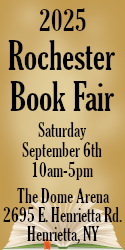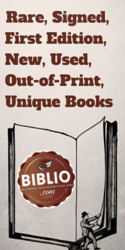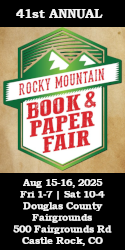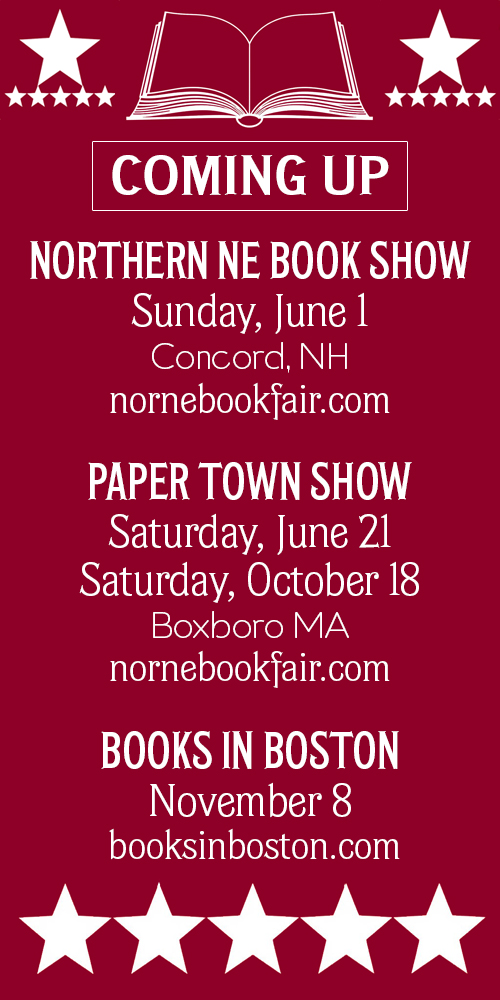The Fragrant Bookshop
He came in carrying a case and a clipboard and wanted to know if I was the decision-maker. (I am always disarmed when someone refers to me, a simple bookselling drudge, as a “decision-maker”. And salesmen know it.)
“What are you selling?” I asked him.
“We fragrance retail shops and offices,” he said.
As a linguist and a grammarian, I was mildly taken aback by his use of the noun “fragrance” as a verb, but I held my tongue. I’m glad I did. Though my instinct begged me to condemn “to fragrance” as an unfortunate solecism, upon reflection I began to see it as a rather wonderful addition to our language. Why not verb a noun when the mood takes you? Good heavens, if Keats had written “Bright rosebud, would I could fragrance Fanny’s bosom as thou dost,” we’d say the use of “fragrance” as a verb was poetic in its beauty and its daring. Wouldn’t we? Well, I would. As I drifted in this semi-semiotic reverie, the man from “Eco-Mist” was preparing to action his sales pitch and spread out his wares. So I permissioned him to plug in the vaporizer which would waft exotic essences round my bookstore. Fragrance it, in fact. “Which one would you like?” he asked. “Coffee? That’s a lovely aroma. Patchouli? Attar of Roses? Ylang-ylang? Fresh-baked bread? There’s a whole list here to choose from.”
I hesitated. The thing is, a secondhand bookshop is already fragranced. It has its own subtle aroma, deriving from a number of sources: partly from the building and its environment, partly from the people and from the livestock which frequent it, and partly from the books themselves. I shall disentangle all this in a moment. But first, I ask you to relax. Imagine that you are deep inside your favorite old bookstore. Books surround you. You are quite alone. Now close your eyes. Inhale deeply. There! You have it now, in your nostrils, on your tongue even, the essence, the quintessence, the duodecimessence even, of old bookshop. Is it not delightful? (OK, you can open your eyes now).
Did not Wordsworth write: “The bookshop doth like a garment wear the fragrance of old volumes”? Well, no he didn’t. But he might well have. Just as Keats might well have written: “I have been half in love with fragrant bookshops.” Oh Keats! What have they done to you in Bright Star? If the review sent to me by my friend Franziska, is anything to go by, not much. But I haven’t seen the film yet. And if you have, and have strong feelings about it, please write to the editor.
Half in love? I’d like to have a dollar for every time I’ve heard this in my shop: “Oh my God! Don’t you just loooove the smell of old bookshops?” I often have the urge to reply: “Yes, I do. Very much. Especially this one.” But I say nothing. I know the question is rhetorical. Who doesn’t love the smell of old books and old bookshops? And this bookshop smell is one advantage we booksellers who have bricks-and-mortar bookstores have over internet booksellers. There are no smells or fragrances of any kind to be had when you visit virtual bookstores. Not yet anyway. But perhaps it’s only a matter of time before Amazon starts pumping Eco-Mist fragrances down the information highway.
So what is this smell traditional to old bookshops? I see no reason to be coy about this. I’ve had around sixty years to ponder the question and I’ve worked it out in a reasonably scientific manner and here is the answer: two parts mould, mildew or fungus, one part tomcat (or polecat or dog), two parts tobacco, one part whiskey, one part dubbin or leather dressing, one part mothballs, one part stale carpet, one part old socks and seven parts dust. Which—to save you adding up—makes a nicely rounded cocktail of seventeen parts. Now, laid out baldly like this, the mix is not particularly appetizing, is it? This is the problem with the scientific approach. To get at the truth, you have to pull the wings off butterflies. But, magically, the whole manages to smell a lot better than the sum of its parts.
I say this is the traditional smell. This is how quaint old Dickensian bookshops used to smell, in the good old days. It’s the archetypal bookshop aroma. But I suggest that this cocktail of smells is under threat. Not just from the man from Eco-Mist and his Vaporizer, but from the almost irresistible forces of new aromatic correctness.
Let’s take tobacco. Time was when old bookshops reeked of smoke. Like the man in the prologue to The Neverending Story, the bookseller sat behind the desk, drawing on his pipe, exhaling great billows of smoke. You could hardly see across the room. And all the books in the shop lapped up the smell and held it, so when you opened a book you got a blast of its tobacco breath. Now, I’m not a smoker and I abhor the smell of cigarettes. But pipe smoke, and the fragrance of cigars, cheroots and cigarillos, that’s another matter. I love them. All gone now. At least from bookshops. In this country, and probably in yours too, all smoking in retail premises is banned. Of course it’s a good thing. But there are times when my nose longs wistfully for a bookshop mellow with the aroma of old shag or rolled tobacco leaf.
Instead of tobacco smells, what you often get nowadays is New Age smells. Incense for example—in numerous woody fragrances, from sandalwood to cedar. Incense smoke stalks you round the bookshop, curls round your throat and quietly tries to throttle you. Or there are candles. Beeswax candles smell lovely, but most candles and all the tea-lights I’ve ever met are paraffin-based and aren’t fragrant at all. Unless they’ve been fragranced that is. And then there are those dinky little aromatic oil burners. But when I’m browsing for books I don’t want the shop to smell like an Indian temple or a Chinese doss house or a Melbourne massage parlor.
But I don’t mind a whiff of woodsmoke. An open fire, blazing and crackling in a hearth, is a lovely feature in a bookshop. In many cities open fires are prohibited. Not in Melbourne. Open log fires in winter still feature in a small number of bookshops here. And burning eucalyptus gives out a really nice smell. In upcountry Victoria, most bookshops still have potbelly stoves for their heating. How wonderful to step from the cold outdoors into the snugness of a country bookshop heated by a log stove. Though snugness can turn to fugginess and frowst. In the old days, in winter, the Lake Daylesford Book Barn used to smell pungently of singed and simmering dog, as Stumpy, the bookshop familiar, toasted himself in front of the “Ned Kelly”. And it was a fragrance which could overpower even the smell of cigarillo smoked by the owner.
Dogs in bookshops are part of the great tradition. And, if they are boy dogs, entire and not gelded, they do what boy dogs do. My little Maltese, Scout, would trot merrily round my bookshop, in the old days, and mark his territory. Despite threat, entreaty and even chastisement. I spent a fair amount of time following his trail, cleaning up books and carpet, with sponge, rags and disinfectant. Fastidious people should keep away from bookshops where male dogs range freely. Especially from books located at floor level. But in some ways cats are worse. I doubt if you can find tomcats in bookshops nowadays, but you could, once. And they loved to mark their territory too. Today’s bookshop cats are neutered or spayed, but even they can get lazy; they find a quiet corner of carpet and adopt it as a toilet Bookshop cats and dogs have this in common: they keep mice away, and a shop which pongs of mice really isn’t nice. Though probably it’s a better smell than in Cole’s Book Arcade in Melbourne. In this bookshop, which flourished in the second half of the nineteenth century, one corner was set aside for a menagerie. This included various apes and chimpanzees. No doubt scrupulous hygiene was practised. And no doubt Victorian people were less squeamish than us about smells. They had to be, when open sewers were part of the streetscape. But still. You do wonder. Chimpanzees in a bookshop?
In the good old days, quite a few old bookshops reeked of liquor. If not by midday, at least by mid-afternoon. You recall the scene: a shop counter strewed with glasses, open bottles and sundry body parts of the bookseller and his cronies: Alcoholic fumes hover in the air. Perhaps a card game is going on. Do you sigh? Those were the days! Or do you shudder? It’s not very professional, to your eye (and nose), nor is it to mine. Nowadays, in the new age of the bookshop, the drink of choice is more likely to be Chardonnay or Pinot Grigio, and it will be served elegantly to customers who have come for a signing or a special literary event. And the bookseller will be on plain water. Or coffee.
Because the signature smell of bookshops now isn’t alcohol. It’s coffee. You walk in, you hear the pleasant chuckling of a coffee pot on the hob, or the hiss of the Gaggia coffee machine half-hidden among the books and you are seduced by the scent of fresh-brewed coffee. And it’s not from the Eco-Mist machine. More and more bookshops (see Paul Minet’s column, passim) have taken to serving coffee. Mine isn’t one of them. When I have more than a dozen professional baristas offering excellent coffee for sale within 100 yards of my front door, I don’t see the point. But sometimes, when I’ve bought 250grams of fresh-ground coffee I stick the packet on the counter and savor it—and let my customers savor it too—for a whole morning. The air of my shop is fat with its fragrance. Someone tell me please: how is it that even the best cup of coffee never tastes even half as good as fresh-ground coffee smells?
Something I like to do is keep a vase of fresh flowers on the shop counter. For preference, fresh fragrant flowers. In spring, jonquils, narcissi, lilac, freesias; at other times, stocks, magnolia grandiflora (that heavenly lemony scent!), lilies, lavender, rosemary and—always, when I can get them—scented roses. I don’t see the point of a rose which is not scented. When so many beautiful roses are scented why would you bother with any others? I happened to dip into The Australian and New Zealand Rose Annual 1954 and spotted an Editorial entitled “What Price Perfume?” so the question has been around awhile. He writes: “The National Rose Society of Victoria has never included classes in which points are given for fragrance in the shows. This is as it should be, because we have no means of measuring fragrance.” Oh yes we have! It’s called a nose, and a brain and a lot of practise. Meanwhile he lists four very fragrant varieties, none of which I have heard of: Red Ensign, Hector Deane, Patrick Anderson and (an intriguing literary name) Rubaiyat. Possibly they no longer exist. It is almost impossible to buy fragrant roses in flower shops. But I recommend a posy of flowers in a bookshop. For very little outlay (which is tax-deductible) my flower arrangements delight the eyes and noses of my customers.
As do my fragrant staff. Gone are the old-style booksellers reeking of whiskey, tobacco, old dog and old socks. And if we don’t all smell wonderful, mostly we make an effort. In my shop, Martin smells of a fresh aftershave called Aramis. Another intriguing literary name. (I heard a woman outside my shop the other day admonishing her small child: “Don’t do that, Aramis. It’s rude.” What rudery Aramis was committing I am unable to say. I am also unable to say what sex the child was. Male presumably, but Aramis is the sort of name that could well fit either sex. While Martin and I talked these things over, we fell to wondering what D’Artagnan’s first name was. We think it has never been disclosed. (But if it has, and you know it, please write to the editor.) Birgith, who presides in my shop on Tuesdays, is fragrant with Eau du Soir by Sisley and you know it’s Tuesday because then the shop smells like the perfume department at David Jones. And people like it.
But what do I know of perfumes? Almost nothing. I am sure I am not alone. It is certainly strange that, while the smelling, tasting and judging of food and wine have become minor art forms, with huge literatures and with established training and education programs, the art of smelling, in general, and smelling perfumes, in particular, in an informed, educated and articulate way is really underdeveloped. Yes, we have aromatherapy—with its glut of books—but it deals with only one aspect of the subject. Where are the books which will teach people how to measure fragrance, and not just quantify it, but explain its quality? Yes, there are some. I have a couple beside me now: The Perfume Zodiac (Sydney 1998) by John Oakes and Perfumes: The Guide (New York 2008) by Luca Turin and Tania Sanchez. They are both great fun. While the authors take the subject seriously, they do not take themselves too seriously. I would love to quote what they have to say about Aramis and Eau du Soir, but sadly space does not permit. Be assured that, alongside Winespeak, there exists an emerging Perfumespeak.
Plenty of my customers bring their own fragrance to the shop. And I love to savor the vapor trail they leave behind them. Sometimes I even hazard a guess at the scent. “That’s Vent Vert , by Balmain you’re wearing, isn’t it? “ Astonishment that a bookish decision maker could know such a thing. Well, I know because it’s my mother’s perfume of choice and has been for many years. Sadly, my mother, now aged 86, has entirely lost her senses of taste and of smell. We often hear of elderly folk losing their sight or hearing but rarely these other two faculties. It’s a condition called anosmia. My mum is philosophical about it all: “I can still see and hear reasonably well, and I haven’t lost my marbles. So I have much to be thankful for.” Indeed she has. She still completes the Daily Telegraph cryptic crossword most days, plays viola in an amateur orchestra each week and reads voraciously. Things could be worse. I just hope I do not get to inherit her anosmia.
We all know (I hope) the smell of bookshop mould, mildew and fungus. These growths provided the bass line (or perhaps the drone) in the traditional bookshop’s symphony of smells. In the old days secondhand bookstores were often housed in cheap retail premises—in ancient dingy shops where leaky roofs, rising damp and decaying plaster breathed out their fusty vapours. Things are different now! But even rather elegant shops like mine (I exaggerate a tiny bit) have their damp spots. In serious downpours rain drips through the ceiling near Detective Fiction, either down the walls or straight into a bucket strategically placed. I also have some good unbroken runs of rising damp, to a height of about 18 inches in the older (built 1872) part of the shop, where the plasterwork is cracked peeling or collapsed. Bookcases screen the worst disaster areas. And I haven’t looked behind some of these for 17 years and I don’t intend to start now. But the sweetish smell of decay is there.
Some of the mustiness and fustiness in the ambience of old bookshops comes from mould and damp, but poor ventilation makes it worse.. The air in these places is stale and stagnant, because there aren’t any windows, and certainly not any open windows. My own shop has no windows apart from the two display windows on the street. But we do have ventilation. The front door (except in really cold weather) is always pinned open during shop hours. So fresh air gets in. Just occasionally, in very hot weather (as recently here, when the mercury tipped 43 degrees Celsius (that is 110 degrees Fahrenheit ) I turn on the evaporative cooling system. Then (in theory) cool fresh air gushes through the shop, and out through the open front door, delighting both customers inside and potential customers on the footpath outside. What often happens, however, is that cooking smells from the extractor fans of the countless restaurants nearby—Indian, Chinese and Persian—get sucked into my cooling system. So we get curry-flavored cool air, or sweet-and-sour cool air, or Persian lamb cool air. Or sometimes all three together. Which is nice, too, in its way, and pleasantly multi-cultural. And curried sweet-and-sour lamb air is surely better than musty-mouldy-fungal air.
Carpet is the other culprit, contributing to general mustiness. I have had the same patterned carpet in my shop for the past seventeen years. It is regularly vacuumed but as far as I can recall has never been shampooed. Its pattern has grown more intricate, its texture richer and more intense as the residue from things slopped and spilled on it or tramped into it matures. I will not itemize these things. You can imagine them. The newer style of old bookstore has no carpet. It has polished wood floors with Afghan rugs. And it smells of wood and polish. Which is very delicious, in its way.
Nor do the new style bookshops have dust. As a matter of fact I have nothing much to say about dust. I am told that it exists in bookshops, especially the older style bookstores, but I never see it, never have seen it and there isn’t any in my shop. Certain people (and they are all female) say that, on the contrary, old bookshops (even mine) are full of dust, and cobwebs, and that the smell is very distinctive. When I ask them to describe the smell of dust, they can’t, without going round in circles. (“Dust smells like, well, dust.”) If you can describe what dust smells like, please do write to the editor.
Now to the books. I’m pretty repelled by books which are impregnated with the pong of tobacco. It’s not just the smell—when you open the book it’s like inhaling an ashtray full of fag-ends—it’s also the nicotine residue, the brown muck, that clings to the jackets and the edges. Somehow books affected by fire smoke—the sort that sometimes you can buy from insurers after a house fire—do not offend me in the same way. There’s a story, drama even, behind this smell. And it was accidental. Perhaps the worst smelling books I ever bought came from a couple who lived above their fish-and-chip shop. The books simply reeked of hot fat and fried fish. I tried hard to air them—as I do with all foul-smelling books—but this smell was particularly persistent. Once stocked on my shelves, the books made the shop smell like Greasy Joe’s. So I sold them from the outdoor tables, where the air was fresher. Even so, a lot of customers stood at the counter with wrinkled noses, as they paid up.
Just occasionally, a customer elects not to buy a book because it smells bad. A case in point: Bruce Chatwin’s Songlines, a fine copy in dustjacket: spurned when the man opened it and inhaled. “Mothballs,” he said in disgust and put it down. I just wrote: “a fine copy in dustjacket.” But here’s a question. Can any book fairly be described as “fine” if it smells bad? Has anyone seen a catalogue description which gives some olfactory judgement or warning about a particular book? If so, Please let the editor know. Mothballs! How I detest books which reek of naphthalene! Yes, I understand completely why they reek of naphthalene. But still.
Most books left to their own devices don’t smell of much at all, I reckon. . I’ve just sniffed my way along a couple of shelves holding what I call my “Antiquarian, Quaint and Curious Books.” Here’s The Lady of the Lake by Sir Walter Scott, Tenth edition, Edinburgh 1814 in full calf. (I expect to have this book forever). It smells of, well, nothing. Not musty, not leathery, not anything really, just neutral. And it’s the same with most of them . Except for one which is heavily foxed and has suffered from damp at some point: now this one does smell old and interesting. It’s frowzy and slightly sweet-smelling. It’s as though the bouquet of the book has been released by dampness, by contact with water, exactly as the bouquet of wine is released by contact with air. No doubt there is a whole new science—or art—here to be explored: describing the “bouquet of the book” with all its subtleties and nuances. Who knows? This could well be the subject of the short course I’ll be offering next semester at The Melbourne School of Bibliopoly.
At least one of my exhibits will come from the series of Penhaligon’s Treasury of Scented Books. I bought a clutch of them before Christmas. They have titles such as Love, The Language of Flowers and A Victorian Posy. The books are impregnated with some sort of perfume and then imprisoned in tight-fitting slip-cases, presumably to keep the perfume “in”. The question has to be asked: by what process is the perfume applied? By dusky maidens barefoot in Bali? Or by some dull mechanical process in Beijing? Please, if you know the answer, let the editor know. With photos too, if you have them (of the books, I mean, not the dusky maidens.) Actually please don’t let the editor know about this. Or anything else. He has a lot on his mind at the moment (see editorial).
In any case if you have any books which smell not quite right, help is at hand.
You can now simply send off for Book Deodorizer “the perfect solution to a smelly problem. These granules absorb moisture and odors….will remove cigarette smoke, stale mildew and general mustiness.” Available from a bookseller in Massachusetts. At last! And if these granules are available in industrial strength presumably you could deodorize your shop, your staff and your customers as well as your books. Brilliant. Unless you think that it isn’t. That it’s just part of the general ponging-down of our society. That obsessive fastidiousness is taking over, driving out smells and odours which are not really so very unpleasant. But I don’t know many really fastidious people. Really fastidious people don’t come into old bookshops for fear of catching germs from smelly old books (or booksellers).
I ended up not buying the Eco-Mist system. When the salesman asked me what aroma I wanted, I said “old bookshop.” I meant it too. I like the smell of this place. And places like it. After all, as Emily Dickinson almost said, “There is no fragrance like a bookshop to take us lands away.”


























